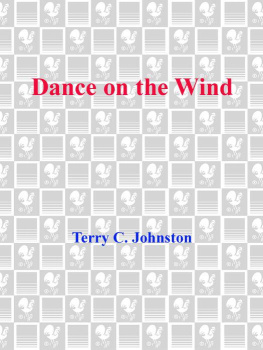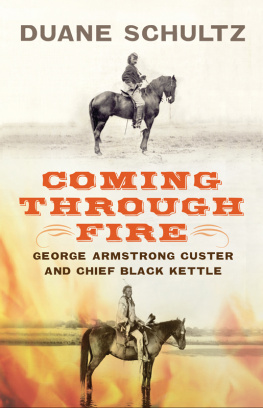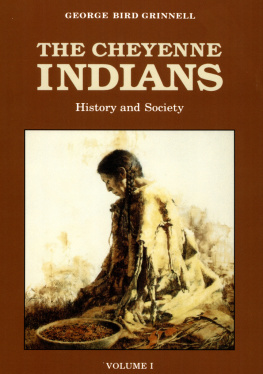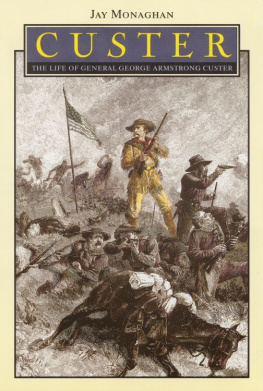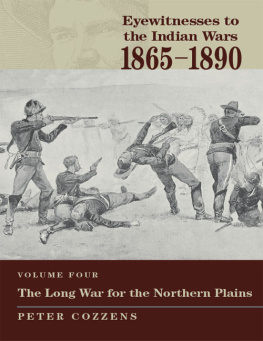From the battlefield to the homefront, they were the proud and passionate inheritors of a glorious frontier, their fates linked to the star of one ambitious, enigmaticand tragicman
LIEUTENANT COLONEL GEORGE ARMSTRONG CUSTER
Driven to succeed at any cost, his destiny was bound inextricably to the savagely beautiful Great Plainsand to the very people he came to conquer.
GENERAL PHILIP SHERIDAN
A seasoned commander and Civil War hero, hed witnessed firsthand just how fierce the Boy General could beand tried to protect his friend Custer from himself.
TOM CUSTER
An incorrigible ladys man, rogue, and hero in his own right, he worshipped his famous brother to a fault and would take his stand beside him no matter what.
ROMERO
A half-breed scout, his loyalties were divided between his Mexican and Cheyenne heritageand the white mans army he was paid to advise.
LIBBIE CUSTER
As Custers beloved wife, she understood the soldier in her husbandbut not the complex man who yearned for the one thing she could never give him.
MONASEETAH
Daughter of a proud people, she lost her family to the pony soldiers only to lose her heart to the fiercest and most famous of them allCuster.
Terry C. Johnstons triumphant novel
LONG WINTER GONE

General George Armstrong Custer as he appeared in the Washita Winter of 1868-1869. Photograph courtesy of the Custer Battlefield National Monument
CONTENTS
Dedicated to my friends,
Charlotte and Jory Sherman
for all your time and tears, work and worry
Ill never be able to repay what you both have
given me from the heart and core of your beings.
Indian women soon got to know the white men very well indeed. Many became wives, mistresses, casual bedfellows. The relationships that evolved were about as intimate as human contacts could well be. Yet, there was a gulf that was never bridged: a chasm, not just of race but of archaeological time, that perhaps no civilized white man has ever succeeded in closing between himself and a primitive woman.
WALTER OMEARA
Daughters of the Country
I was wondering, an Ankara chief mused, whether you white people have any women amongst you. I assured him in the affirmative. Then, said he, why is it that your people are so fond of our women? One might suppose you had never seen any women before.
HENRY M. BRACKENRIDGE
Journal of a Voyage Up The Missouri River, in 1811


PROLOGUE
T HE hell of it is I cant seem to put my finger on whats gnawing in my goddamned gut, Philip H. Sheridan growled.
As he tore the moist stub of a cigar from his thin lips, a bit of dead ash fell on the lapel of his dark blue army tunic. He brushed off what he could with a quick swipe of a hand, smudging the gray into the uniform like a street beggar. Lieutenant General Sheridan studied each one of his staff in turn.
Lieutenant Colonel Michael V. Sheridan was the first to speak, answering his older brothers question. I dont understand whats eating at you, Philip. Custer won the victory we were certain could be won.
And a stunning success it was at that, General, echoed Major Nelson B. Sweitzer of the Second Cavalry.
No mistake about that, Nelson. Sheridan used his cigar to jab home the point. Still, a voice inside troubles me.
In stony silence, the commander of the Department of the Missouri turned back to the wide window behind his massive oak desk, his eyes gazing far beyond the bustling Topeka, Kansas, street below. Though he stood shorter than most of the officers gathered around him, Sheridan somehow conveyed a greater stature than most men of the day. Here stood a confident man, every inch of muscle rippling with the martial fervor that had made him the hero of countless cavalry battles in the late war between the states.
But that rebellion lay some four and a half years behind him. Today he had a new war to fight.
The leaden skies dropped a wet, icy snow that turned the Topeka streets into a barnyard slop. Sheridan turned back to his staff and sank heavily into his chair at last. Sandy, tell me what youre thinking.
Major George A. Forsyth cleared his throat. Undoubtedly, Custer did more at the Washita than my command of frontier scouts ever hoped of doing, pinned down on Beechers Island, General. I cant fault him his success.
He damn well could have gotten himself wiped out! blurted Lieutenant Colonel James W. Forsyth, Sandys brother. Himself along with a good piece of his regiment. But we all know that, dont we? Thats something no one in this room has had the guts to mention. Begging the Generals pardon
Sheridan waved his hand; flakes of ash littered the papers scattered across his desk. No offense, Tony. We all knowdont we, gentlementhat Tonys right. But thats not all that bothers me. He rose stiffly, the cold in this office penetrating to his marrow more of late. At the nearby hutch where the ever-present bottles and glasses waited, Sheridan poured himself a few fingers of amber liquid. Without ceremony or inviting the others to join him, he tossed the fire down a throat more parched these days with the burn of long hours and too many cigars.
Is this damned Custer doing a single thing different than he ever has in his military career, sir? Michael Sheridan asked.
With the back of his hand the general wiped some lingering drops of whiskey from his bushy mustache after a second drink. Near as I can tell, Custers still the same cavalry magician he was at Gettysburg, Shenandoah, and Appomattox Wood. He slammed the empty whiskey glass down. And frankly, gentlemenPhilip H. Sheridan isnt a man to argue with success.
All of us need reminding that those victories were exactly why we wanted Custer brought out of that year of his unofficial retirement. Major Morris V. Ashe uttered the words the rest of Sheridans staff wouldnt admit to. All of us asked for him back before his court-martial was over simply because we all knew he was the only one who could march into Indian Territory. Any man here who says he didnt believe Custer was the only one who could slash his way through the hostile tribes last year is a damned liar.
Strong words, Major. Michael Sheridan sank into his horsehair-stuffed chair, hands steepled before his bearded chin.
But true, sir, Ashe said. Wasnt a one of us didnt know what Custer could accomplish what Custer is.
Sounds like you agree with his tactics, Morris.
Ashe glared at Michael Sheridan. He won, didnt he?
The younger Sheridan turned away without a word, lighting his own cigar.
Goddamn it, thats what were all about, isnt it? Ashe prodded the rest of them.
Philip Sheridan finally filled the aching silence. Yes, Major. I suppose you are more than right. Youre damned right. We are army. Its not just what we do. Its what we are.
General, again I beg your pardon, Tony Forsyth said, but Custers success last winter dont hide the fact that he blundered twice in winning his startling victory.
Next page

